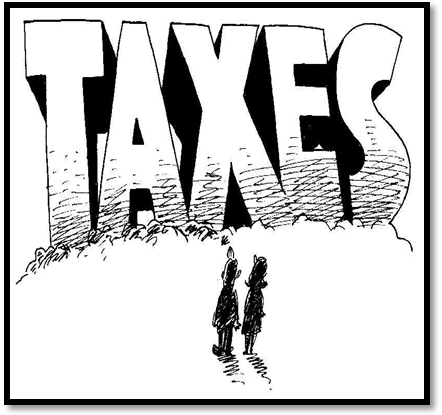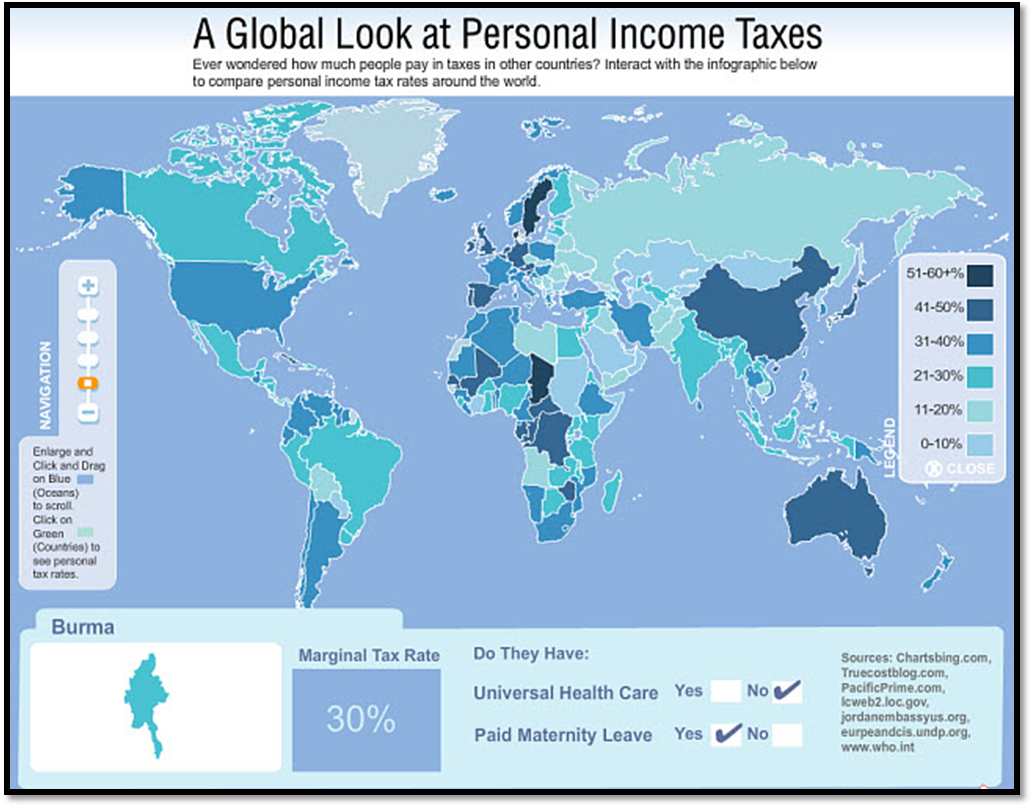
LVIV INSTITUTE OF BANKING OF UNIVERSITY OF BANKING OF THE NATIONAL BANK OF UKRAINE

INDIVIDUAL WORK
“Taxes”
group 305-FKbs
Svyatoslav Sharun
Lviv 2012

TYPE OF TAXES
Taxes are sometimes referred to as direct ( a tax paid directly to the government by the persons on whom it is imposed) or indirect (a tax collected by an intermediary (such as a retail store) from the person who bears the ultimate economic burden of the tax (such as the consumer)). The meaning of these terms can vary in different contexts, which can sometimes lead to confusion. In economics, direct taxes refer to those taxes that are collected from the people or organizations on whom they are imposed. For example, income taxes are collected from the person who earns the income. By contrast, indirect taxes are collected from someone other than the person responsible for paying the taxes.
From whom a tax is collected is a matter of law. However, who pays the tax is determined by the market place and is found by comparing the price of the good (including tax) after the tax is imposed to the price of the good before the tax was imposed. For example, suppose the price of gas in the U.S., without taxes, were $2.00 per gallon. Suppose the U.S. government imposes a tax of $0.50 per gallon on the gas. Forces of demand and supply will determine how that $0.50 tax burden is distributed among the buyers and sellers. For example, it is possible that the price of gas, after the tax, might be $2.40. In such a case, buyers would be paying $0.40 of the tax while the sellers would be paying $0.10 of the tax.
Income tax
Income tax (a tax levied on the income of individuals or businesses (corporations or other legal entities). When the tax is levied on the income of companies, it is often called a corporate tax, or profit tax) is commonly a progressive tax because the tax rate increases with increasing income. For this reason, it is generally advocated by those who think that taxation should be borne more by the rich than by the poor, even to the point of serving as a form of social redistribution. Some critics characterize this tax as a form of punishment for economic productivity. Other critics charge that income taxation is inherently socially intrusive because enforcement requires the government to collect large amounts of information about business and personal affairs, much of which is considered proprietary and confidential.
Income tax fraud is a problem in most, if not all, countries implementing an income tax. Either one fails to declare income, or declares nonexistent expenses. Failure to declare income is especially easy for non-salaried work, especially those paid in cash. Tax enforcement authorities fight tax fraud using various methods, nowadays with the help of computer databases. They may, for instance, look for discrepancies between declared revenue and expenses along time. Tax enforcement authorities then target individuals for a tax audit – a more or less detailed review of the income and tax-deductible expenses of the individual.
Income tax may be collected from legal entities (e.g., companies) as well as natural persons (individuals), although, in some cases, the income tax on legal entities is levied on a slightly different basis than the income tax on individuals and may be called, in the case of income tax on companies, a corporation tax or a corporate income tax.
Poll tax
A poll tax (a tax of a portioned, fixed amount applied to an individual in accordance with the census (as opposed to a percentage of income)), also called a per capita tax, or capitation tax, is a tax that levies a set amount per individual. The earliest tax mentioned in the Bible of a half-shekel per annum from each adult Jew was a form of poll tax. Poll taxes are regressive, since they take the same amount of money (and hence, a higher proportion of income) for poorer individuals as for richer individuals. Poll taxes are difficult to cheat.
Value added tax
A value added tax (sometimes called a goods and services tax, as in Australia and Canada) (a form of consumption tax. From the perspective of the buyer, it is a tax on the purchase price) applies the equivalent of a sales tax to every operation that creates value. To give an example, sheet steel is imported by a machine manufacturer. That manufacturer will pay the VAT on the purchase price, that amount to the government. The manufacturer will then transform the steel into a machine, selling the machine for a higher price to a wholesale distributor. The manufacturer will collect the VAT on the higher price, but will remit to the government only the excess related to the "value added" (the price over the cost of the sheet steel). The wholesale distributor will then continue the process, charging the retail distributor the VAT on the entire price to the retailer, but remitting only the amount related to the distribution markup to the government. The last VAT amount is paid by the eventual retail customer who cannot recover any of the previously paid VAT. Economic theorists have argued that this minimizes the market distortion resulting from the tax, compared to a sales tax.
VAT was historically used when a sales tax or excise tax was uncollectible. For example, a 30% sales tax is so often cheated that most of the retail economy will go off the books. By collecting the tax at each production level, and requiring the previous production level to collect the next level tax in order to recover the VAT previously paid by that production level, the theory is that the entire economy helps in the enforcement. In reality, forged invoices and the like demonstrate that tax evaders will always attempt to cheat the system.
direct |
Прямий, безпосередній |
indirect |
Непрямий, посередній |
confusion |
Замішання, путанина |
income tax |
Прибутковий податок |
market place |
Ринок |
to distribute |
Розприділяти, розміщувати |
progressive tax |
Прогресивний податок |
to advocate |
Підтримувати, захищати |
to bear (bore, borne) |
Носити, перевозити |
redistribution |
перерозподіл |
inherently |
В дійсності, по суті |
intrusive |
Навязливий |
proprietary |
Характеризує чиюсь власність |
tax fraud |
Податковий обман |
to implement |
Виконувати |
discrepancy |
Відмінність, не відповідність |
revenue |
Дохід |
to target |
Ставити ціль |
tax-deductible |
Виключений з податкової суми |
legal entity |
Юридична особа |
natural person |
Фізична особа |
corporation tax corporate income tax |
Корпоративний податок |
Poll Tax per capita tax capitation tax |
Особовий податок |
per annum |
щорічно |
regressive |
регресивний |
hence |
Відповідно, з цього випливає… |
to cheat |
шахрайство |
Value Added Tax (VAT) |
Податок на додану вартість |
sheet steel |
Листова сталь |
manufacturer |
Підприємець, виробник |
purchase price |
Закупівельна вартість |
to remit |
Відсилати поштою |
wholesale distributor wholesaler |
Оптовий торгівець |
retail distributor |
Роздрібний торгівець |
markup |
Націнка, надбавака |
eventual |
кінцевий |
to recover |
Відновляти, оживляти |
distortion |
Згин |
sales tax |
Податок з продажу |
excise tax |
Акцизний збір |
uncollectible |
безнадійний |
off the books |
позабалансовий |
production level |
Рівень виробництва |
enforcement |
Примус, тиск |
to forge |
Підробляти документи |
invoice |
Рахунок |
the like |
Похожі |
tax evader (evador (UK)) |
Особа, яка ухиляється від сплати податків |
|
|
